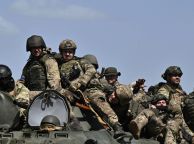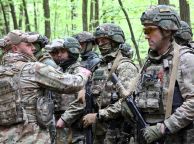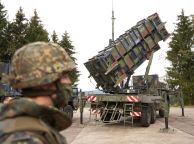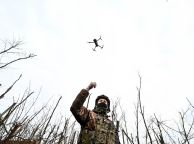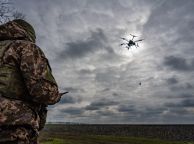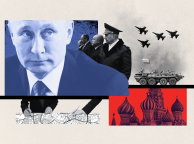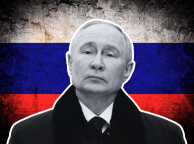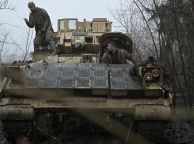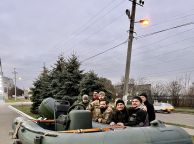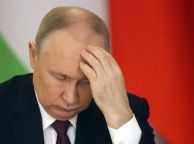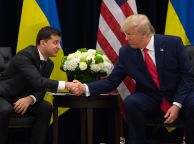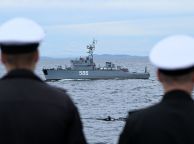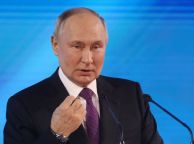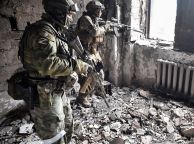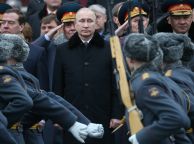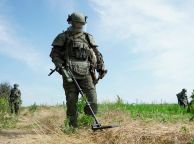

This week, Capitol Hill took on the feel of Kyiv as several Ukrainian officials and members of parliament made their way to Washington to lobby American legislators amid ongoing wrangling over a proposed aid package that would send over $60 billion in assistance to Volodymyr Zelensky's government. The U.S. government ought to pass the bill. Then, it ought to be prepared to pass several more.
Exactly one year ago, in the immediate aftermath of Ukrainian counteroffensive operations that successfully liberated large swathes of territory in the country's south and northeast, the Russian army appeared as if it might be on the verge of a devastating collapse. However, Moscow's mobilization drive, coupled with the ramping up of arms production and the procurement of Iranian drones, North Korean artillery shells, and smuggled microchips, have restored Russia's war machine to a level of functionality sufficient for defending the Ukrainian regions it still occupies.
The trend is not moving in Ukraine's favor. This past summer, Ukraine's attempt to regain the kind of momentum it achieved in the fall of 2022 largely failed, as the minor territorial gains it made in an effort to cut the Russian land bridge to Crimea came at an unsustainable cost. Although Russia's thus far unsuccessful attempts to take the eastern city of Avdiivka have likely come at a higher absolute price, Russia has more men and material to lose before it begins to feel the relative effects of attritional warfare as acutely as Ukraine has come to over the past few months.
While some on Capitol Hill and beyond have taken the current stalemate as a sign that it is time for both parties to sit down at the negotiating table, such calls for compromise ignore the reality that Russia has shown no intention of giving up the fight. In order to have a chance at keeping up its defensive efforts while simultaneously reconstituting its forces, Kyiv needs the $60 billion in aid under consideration in Congress. Then, when that package runs out, it will likely need another, which is likely to be followed by another.
The Biden administration has pledged to stand by Kyiv for "as long as it takes," and yet, it is Russia that is rearming. If Washington wishes to maintain its credibility in the world, it should start by passing the first of what is likely to be many additional aid packages for Ukraine.
Ukrainian forces have taken out a Russian Mi-8 transport helicopter in the east of the country, Kyiv's military has said, sharing dramatic footage appearing to show the moment U.S.-made weapons hit the helicopter.
The Ukrainian armed forces "functionally destroyed" the Mi-8 helicopter close to the city of Lyman, in the eastern Donetsk region, on Wednesday, Kyiv's military communications platform said in a statement on social media.
Two allies of Russian President Vladimir Putin were killed within hours of each other Wednesday as the war between Russia and Ukraine rages on.
Kyiv officials took credit for the killing of ex-Ukrainian politician Illia Kyva, a 46-year-old pro-Russia politician, whose body was found in a suburb near Moscow. Russian outlets also reported that Oleg Popov, former deputy of parliament for the Russian-occupied Luhansk People's Republic (LPR), was killed in a car explosion Wednesday.
Germany's defense minister Boris Pistorius has said that his country is doing everything it can to help Ukraine fight Russian aggression but noted that Kyiv was not an ally of Berlin.
The comments by Pistorius during a television interview follow accusations that Berlin has been reluctant to provide military support for Ukraine to use in the war started by Vladimir Putin.
Tom O'Donnell, a geopolitical analyst based in Berlin, told Newsweek that Pistorius wants to see Ukraine get more weapons from Germany and the EU but may face opposition from within his government.
Kyiv has touted Western military support for helping its forces liberate half of its Russian-occupied territory, as the latest map by the Institute for the Study of War (ISW) shows Ukrainian progress since the start of Vladimir Putin's invasion in 2022.
Ukrainian defense minister Rustem Umerov told Fox News that Ukraine had "de-occupied 50 percent of our territory" and were "defeating Russia on our land."
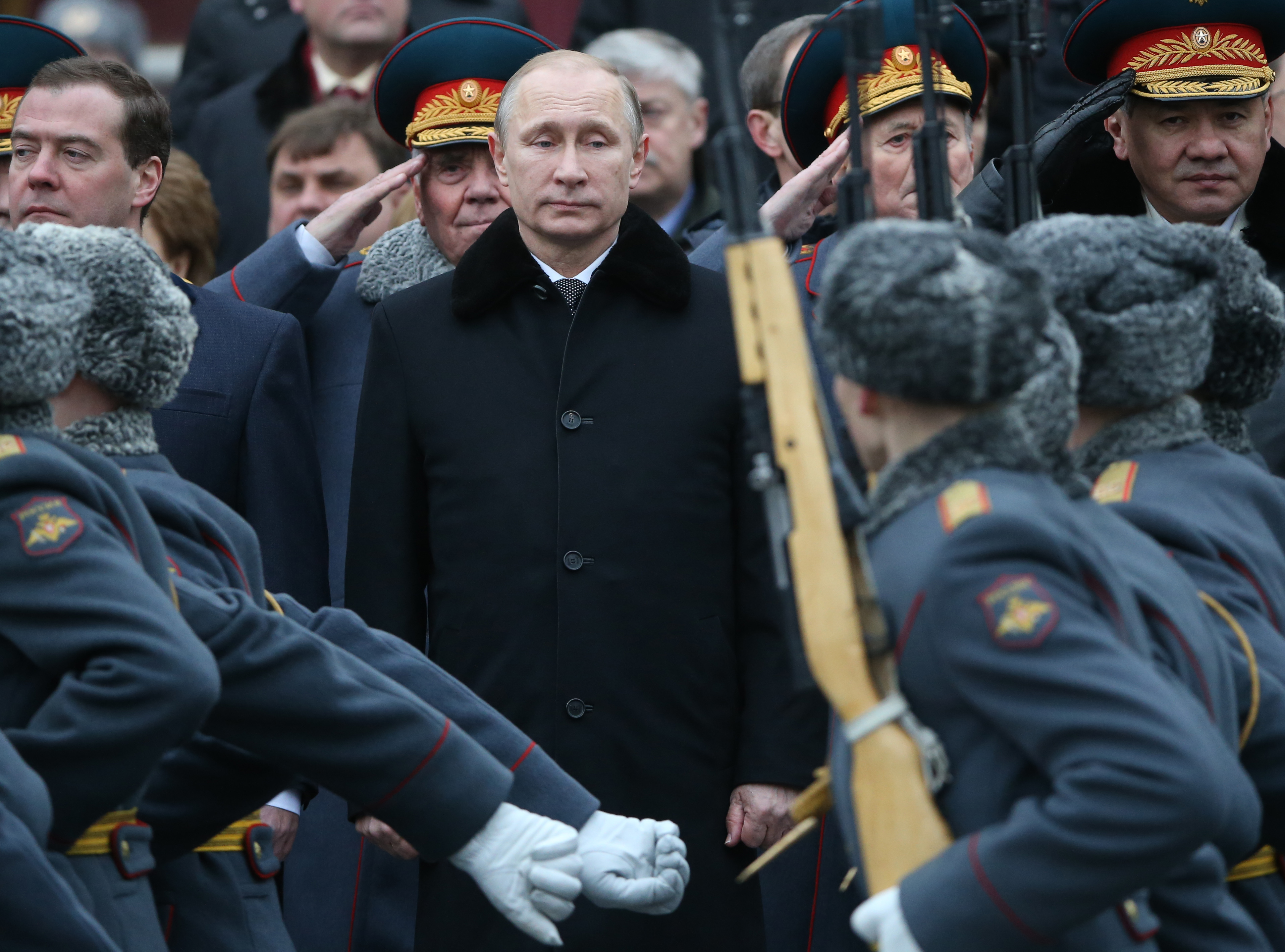
A decade ago, following a U.S. decision to arm Syrian rebels to which he was staunchly opposed, Russian President Vladimir Putin was unequivocal on the subject of cannibalism.
"One does not really need to support the people who not only kill their enemies, but open up their bodies, eat their intestines, in front of the public and cameras," he said, likely responding to video footage of a rebel commander cutting the body of a fallen soldier and biting into one of his organs.
"Are these the people you want to support? Is it them who you want to supply with weapons?"
Now that stance seems to have changed. Not only has Russia revived the Stalin-era practice of throwing convicted murderers onto the battlefield to support its war in Ukraine, this so-called "suicide squad" includes at least two cannibals.
The Kremlin has recruited tens of thousands of prisoners since the full-scale invasion of neighboring Ukraine began in February 2022 to create its "Storm-Z" squads, which are deployed to carry out highly attritional, infantry-led frontal assaults at the most dangerous parts of the battlefield.
Russian officials have never acknowledged creating Storm-Z units with convicts, and the Kremlin hasn't confirmed the total number of prisoners recruited by the now-dissolved Wagner Group and the Defense Ministry.
However, Newsweek has learned that the total number of convicts who have been offered presidential pardons in exchange for six months fighting in Ukraine exceeds 100,000, with some 50,000 now free to walk the streets of Russia.
A list of some of the prisoners recruited into the Russian military obtained by Newsweek revealed that men past retirement age are among them. The majority are convicts from the country's ethnic minority republics, Olga Romanova, the head of Russia Behind Bars, a charity advocating prisoners' rights, told Newsweek.
This highlights what critics say is the dispensable nature of such soldiers—a sentiment with which even those serving on the front line appear to agree.
"Storm fighters, they're just meat," a Russian soldier who has fought alongside members of Storm-Z told Reuters in October. The news agency said Putin's Storm-Z units—each about 100-150 strong—combine pardoned convicts and regular troops who face disciplinary action, reminiscent of Josef Stalin's Soviet penal battalions.
One Russian milblogger cited by the Institute for the Study of War (ISW), a U.S.-based think tank, claimed that Storm-Z assault detachments in the Avdiivka direction in Ukraine's east, and on Bakhmut's southern flank, are often destroyed after a few days of active operations, losing on average between 40 percent to 70 percent of their personnel.
The practice of recruiting in Russia's penal colonies began when the Kremlin was believed to be facing acute manpower shortages. Luring prisoners in with pardons from Putin and cash incentives has allowed Moscow to boost its manpower without mobilizing the young, urban population, which could result in political repercussions.
Among these recruits, however, are cannibals, murderers, rapists, and even a Satanist convicted of the ritualistic killing of four teenagers—all of whom were eligible to be pardoned and released back into society.
Newsweek has contacted Russia's Defense Ministry for comment via email.
At least 17 people who committed high-profile murders were issued pardons for fighting in Ukraine in 2022 and 2023, according to Agentstvo, a Russian investigative site launched in 2021. The publication said all 17 took part in the war, and some have committed crimes again upon their return to Russia.
Nikolai Ogolobyak, a Russian man who confessed to being a member of a Satanist sect, and who was sentenced to two decades in prison for killing four teenagers in a "ritual," is among those pardoned by Putin.
Ogolobyak was sentenced in July 2010 on charges of murder, robbery, and desecrating a corpse. Members of the sect to which he belonged fried and ate their victims' organs at Ogolobyak's apartment in 2008, according to court documents cited by Russian publication 76.ru.
He served for six months with a Storm-Z unit, his father told the publication, adding that he returned from Ukraine on November 2 and is currently living with his mother.
Denis Gorin, another convicted murderer who killed at least four people and ate the flesh of one of his victims, is also believed to have been pardoned by Putin for fighting in Ukraine.
Gorin, 44, from Aniva in the far-eastern Sakhalin region, was convicted of murder three times, the first coming in 2003. Seven years later, he was released on parole, during which he fatally stabbed the brother of the man with whom he was in pretrial detention.
Investigators said he admitted cutting the legs off the man's corpse. He then washed them, put them in a refrigerator, and ate them, according to Sibir.Realii, a news outlet aligned with Radio Free Europe.
Among the other criminals pardoned by Putin is Artem Buchin, a resident of the Perm region, who raped and killed 23-year-old Tatyana Rekutina last year. He was sentenced to 20 years in prison in February 2023, and was freed to fight in Ukraine in August. By November, he had returned to his home town.
Dmitry Zelensky, who was sentenced to 11 years in prison for strangling his 27-year-old girlfriend, Tatyana Melekhina, and putting her body through a meat grinder, was also pardoned this summer after fighting in Ukraine.
The system has faced controversy even within Russia, however.
The Kremlin was forced to respond to backlash over the case of Vladislav Kanyus, who had been convicted of the murder of his 23-year-old ex-girlfriend. Kanyus was sentenced in July 2022 to 17 years in a maximum-security prison over the killing of Vera Pekhteleva in Kemerovo, Siberia, in 2020.
"When I was hitting her, I did not like that she was screaming. I wanted her to shut up," Kanyus told the court last July. Court records show that Pekhteleva had 111 stab wounds, including some on her face.
Putin's spokesman Dmitry Peskov told reporters on November 10 that pardoned convicts have not escaped punishment, but instead "atone with blood for crimes on the battlefield, in assault brigades, under bullets, under shells."
The Russian leader himself admitted that convicts had been deployed to the front lines.
"They gave their lives for the motherland and have fully absolved themselves of their guilt," he said in September.
Neil Melvin, director of International Security Studies at British defense and security think tank the Royal United Services Institute (RUSI), said Putin has resorted to expanding his military's ranks from prisons to avoid ordering a deeply unpopular mass mobilization ahead of the country's 2024 presidential elections.
Putin is expected to announce his bid for another term as president soon. Following constitutional changes made prior to the war in Ukraine, he may remain in power until 2036.
"While there is no danger that Putin will not be re-elected by a substantial margin, the Kremlin is anxious to avoid the elections becoming the focus for discontent or even protests about the war," Melvin told Newsweek.
"For that reason, Russia is holding off from conducting a large mobilization that might touch the families in large cities in European Russia, and is instead looking for recruits from places on the periphery of the country, from amongst national minorities and especially from prisoners," he said.
Russian convicts have been the main source of the country's army's "human wave assaults" over the past year, said Melvin. He added that those who survive are pardoned and released back to society, but that this often results in high rates of reoffending, "especially having endured the traumas of the front and the psychological stress this creates."
Melvin noted that Russia looked to prison labor as a source of troops during the Stalin years, "when the camps contained mostly political prisoners and the repressed." Prisons were emptied to send soldiers to the front, he said.
"The Russian military fights with little regard to causalities, throwing troops into battle and then bringing in fresh units to replace those destroyed, relying on the country's large population and with little regard to life," Melvin added. "For this kind of warfare, prisoners are viewed by the Russian leadership as a resource that can be used with little risk of major political consequences."
Viktor Kovalenko, a former Ukrainian soldier and journalist, told Newsweek that the Armed Forces of Ukraine does not allow enlisting criminals from prisons, "but for Vladimir Putin's government, there is no difference between who holds the Kalashnikov rifle and who sits in the trenches."
"This is a unique Russian way to fight wars since Josef Stalin and World War II. Putin's regime resembles the brutality and immorality of Stalin's Soviet Union in many ways," he said.
Kovalenko added: "The recruitment of criminals allows Putin to keep Russian society away from thoughts about the unrest that would be the case if he would announce mass mobilization."
The price for ordinary Russians, however, is to have those criminals walking free among them once again.
Do you have a tip on a world news story that Newsweek should be covering? Do you have a question about the Russia-Ukraine war? Let us know via worldnews@newsweek.com.
Please send your feedback and ideas to e.montgomery@newsweek.com

